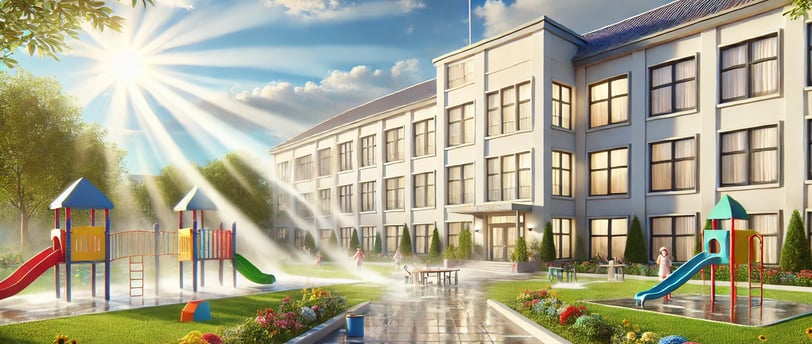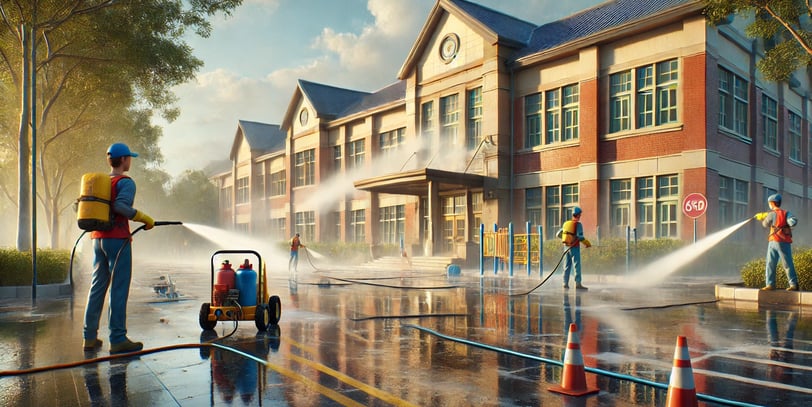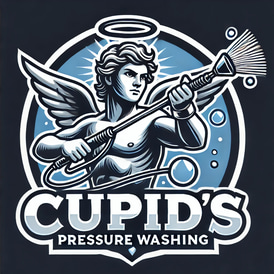How Pressure Washing Can Improve Safety at Pasig Schools
There are many amazing schools in Pasig city, but they require constant pressure washing to ensure that they are clean and safe for the kids. That is why pressure washing services play an important role in keeping them clean and safe.
PHILIPPINESPRESSURE WASHING SERVICESMETRO MANILA MAINTENANCECOMMERCIAL CLEANING SOLUTIONS
12/13/20245 min read


Understanding the Dangers of Algae and Grime on School Grounds
In educational environments, safety is paramount. One of the often-overlooked hazards in schools is the accumulation of algae and grime on walkways and playgrounds. These substances can create dangerously slippery surfaces, increasing the risk of slip and fall accidents, particularly during rainy or humid weather when moisture levels are heightened. Algae thrive in damp conditions, leading to a more significant build-up on external surfaces if not adequately managed.
The risk posed by these biofilms is not theoretical; according to recent reports, slip and fall incidents are among the leading causes of injuries in schools. In fact, the National Safety Council noted that over 25,000 slip and fall accidents occur in the United States daily, resulting in injuries of varying severity. Within the school context, lack of adequate maintenance and cleaning can dramatically elevate these statistics. For instance, in one reported incident, a student suffered a severe injury after slipping on algae-covered playground equipment, prompting questions about the school’s maintenance practices.
Furthermore, algae and grime accumulation is not just a slippery nuisance; it can also harbor harmful bacteria, contributing to health risks that extend beyond physical injuries. These microorganisms can lead to illnesses that affect student attendance and overall well-being. By ensuring regular pressure washing of walkways and playgrounds, schools not only improve traction but also promote a cleaner, healthier environment. Schools, therefore, have a critical responsibility to regularly monitor and address these hazardous conditions, ensuring safety and wellness isn’t compromised. The importance of maintaining clean and safe environments cannot be overstated; proactive measures are essential in protecting students from the dangers posed by algae and grime.
What is Pressure Washing and How Does it Work?
Pressure washing, often referred to as power washing, is a cleaning technique that utilizes high-pressure water spray to remove dirt, grime, mold, and other contaminants from various surfaces. The basic principle behind this method is simple: water is expelled at high velocities, enabling it to efficiently dislodge unwanted substances from areas that may be challenging to clean using traditional methods. This technique is particularly effective for outdoor surfaces such as walkways, playgrounds, and building exteriors, where the buildup of harmful materials can pose safety risks, especially for children.
The equipment used in pressure washing includes a high-pressure washer, which comprises a motor or engine, a pump, and a nozzle. The motor drives the pump, which pressurizes the water and can reach pressures of up to 4,000 psi (pounds per square inch). Different nozzles can be attached to adjust the spray angle and intensity, allowing for versatility based on the surface being cleaned. For instance, a narrow nozzle may be utilized for focusing on stubborn stains, while a wider nozzle can be effective for large areas.
One of the standout features of pressure washing is its effectiveness against biological growths such as algae and mold. These organisms can easily accumulate on surfaces, making walkways and playgrounds slippery and hazardous. Pressure washing targets these growths, employing a combination of high-pressure water and sometimes eco-friendly detergents to break down their structure, allowing for easy removal. Compared to other cleaning methods, such as scrubbing or chemical treatments, pressure washing delivers superior efficiency and quicker results, making it an ideal choice for schools in Pasig aiming to enhance safety in their outdoor environments.
The Benefits of Regular Pressure Washing in Schools
Regular pressure washing in schools offers a myriad of benefits that extend beyond mere aesthetics. One of the primary advantages is the enhanced safety of walkways and playgrounds. Over time, surfaces can accumulate dirt, grime, mold, and mildew, creating slippery conditions that pose hazards to students and staff. Pressure washing effectively removes these substances, significantly reducing the risk of slip-and-fall accidents while ensuring a safer environment for all school activities.
In addition to safety improvements, pressure washing contributes to the overall appearance of school grounds. Clean walkways, playgrounds, and building exteriors create a welcoming atmosphere for students, parents, and visitors. A well-maintained learning environment positively impacts students' morale and can even enhance their educational experience. A case study conducted at a Pasig school revealed that the visual transformation following a comprehensive pressure washing campaign led to increased pride among students and staff, fostering a more cohesive school community.
Furthermore, regular pressure washing can prolong the lifespan of outdoor facilities. By removing harmful contaminants and debris, surfaces maintain their integrity for longer periods. This proactive maintenance can help prevent costly repairs or replacements, ultimately reducing the overall maintenance costs for schools. Schools that have integrated pressure washing into their upkeep routines report significant savings in terms of asset longevity and expenditures on maintenance.
Feedback from Pasig schools that have adopted pressure washing emphasizes its effectiveness in transforming their grounds. Maintenance staff have noted marked improvements in cleanliness and safety following routine pressure washing, allowing them to focus on other essential maintenance tasks. The benefits of regular pressure washing clearly illustrate its importance in creating safer, more appealing, and cost-effective school environments.
Implementing a Pressure Washing Program in Pasig Schools
To effectively enhance safety in schools across Pasig, implementing a pressure washing program for walkways and playgrounds is crucial. This initiative can significantly reduce hazards such as slippery surfaces, mold, and grime accumulation. The first step in initiating a pressure washing program is to determine the optimal frequency of cleaning. Factors such as weather conditions, foot traffic levels, and the types of surfaces may dictate how often pressure washing should occur. Generally, a quarterly schedule is recommended, but more frequent cleaning may be necessary during the rainy season or special events.
Choosing a reputable pressure washing service is pivotal to the program's success. Schools should conduct thorough research by seeking recommendations from other educational institutions and reading reviews from previous clients. It is essential to verify that the chosen service utilizes eco-friendly cleaning solutions and modern pressure washing equipment to ensure safety and sustainability. Engaging with local pressure washing companies can also promote community involvement, fostering relationships that benefit both the schools and local businesses.
Additionally, scheduling pressure washing during off-hours or weekends is advisable to minimize disruptions to the school day. Communicating the schedule in advance to parents, staff, and students will ensure everyone is informed and can plan accordingly. After implementing the program, it is beneficial to establish a maintenance plan to evaluate the cleanliness and safety of surfaces regularly. Encouraging student involvement can also promote care for the environment and instill a sense of responsibility towards maintaining clean spaces.
Overall, establishing a pressure washing program in Pasig schools involves strategic planning, community engagement, and commitment to sustainability. By prioritizing ongoing maintenance and cleanliness, schools can provide safe and welcoming environments for students, staff, and visitors alike.


